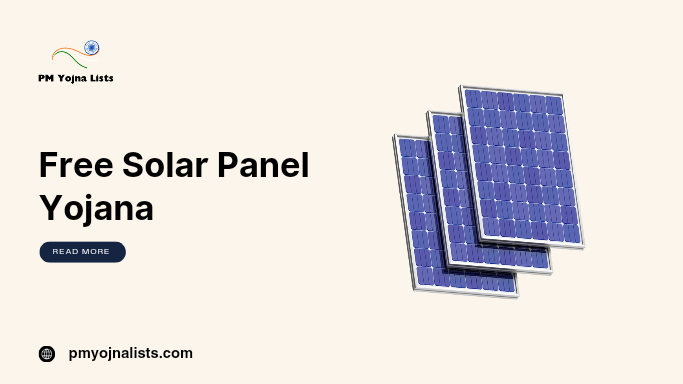Free Solar Panel Yojana: A Comprehensive Guide to Government Solar Schemes
In recent years, solar energy has emerged as a reliable and eco-friendly solution to meet growing energy demands. Governments around the world, including India, have introduced initiatives to promote the adoption of renewable energy sources. Among these initiatives is the Free Solar Panel Yojana, a scheme aimed at providing solar panels at minimal or no cost to citizens, especially in rural and economically weaker sections.
This guide will take you through everything you need to know about the Free Solar Panel Yojana, including its benefits, eligibility, the application process, and frequently asked questions (FAQs). Whether you’re a homeowner, a farmer, or a business owner, this guide will help you understand how you can take advantage of the free solar schemes.

What is the Free Solar Panel Yojana?
The Free Solar Panel Yojana refers to government schemes that offer financial support or free installation of solar panels for individuals or institutions. These programs are part of the larger push toward renewable energy, aimed at reducing the carbon footprint and ensuring energy access for all. In India, various solar panel subsidy programs and initiatives like the PM-KUSUM Scheme are designed to make solar power more accessible and affordable.
Solar energy is a renewable, non-polluting resource that can be harnessed to generate electricity for households, businesses, and agricultural activities. The Free Solar Panel Yojana enables citizens to generate their own electricity, thereby reducing dependency on conventional grid power and cutting down energy bills.
Objectives of the Free Solar Panel Yojana
The primary objectives of the Free Solar Panel Yojana are:
- Promote renewable energy: The scheme promotes the use of solar energy, reducing reliance on fossil fuels and contributing to a cleaner environment.
- Provide affordable energy solutions: By offering free or subsidized solar panels, the scheme ensures affordable access to electricity for economically weaker sections.
- Enhance energy security: It reduces the dependence on grid power and helps mitigate frequent power outages, especially in rural areas.
- Encourage self-sufficiency: Households and farmers can become energy self-sufficient, reducing their electricity bills over time.
- Support rural development: The scheme supports rural electrification by providing solar panels to communities with limited access to conventional energy sources.
Types of Solar Schemes in India
Several solar schemes are currently in operation, providing free or subsidized solar panels to Indian citizens. Some of the most notable schemes include:
1. PM-KUSUM Scheme
The Pradhan Mantri Kisan Urja Suraksha evam Utthaan Mahabhiyan (PM-KUSUM) scheme aims to provide solar energy solutions for farmers by installing solar-powered pumps and grid-connected solar power plants. Farmers can also set up solar panels on barren land and sell the generated electricity back to the grid.
2. Solar Rooftop Subsidy Scheme
Under this scheme, the government provides a subsidy for the installation of rooftop solar panels. Households and businesses can benefit from a subsidy of up to 40% for installing solar power systems up to 3 kW.
3. Saubhagya Scheme (Pradhan Mantri Sahaj Bijli Har Ghar Yojana)
The Saubhagya Scheme was introduced to ensure electricity access for all households, including through the installation of solar panels in remote areas. This initiative aims to provide last-mile connectivity using solar energy where conventional grid power is not feasible.
4. National Solar Mission
The National Solar Mission is one of the major initiatives under the National Action Plan on Climate Change (NAPCC). It promotes the widespread adoption of solar energy and provides subsidies and financial assistance to individuals and institutions setting up solar projects.
5. State-Specific Solar Schemes
Various states in India have their own solar panel schemes, offering free or subsidized solar panel installations to residents. For example, Rajasthan, Gujarat, and Maharashtra have specific solar schemes catering to farmers and rural households.
Benefits of Free Solar Panel Yojana
The Free Solar Panel Yojana comes with numerous benefits for individuals, businesses, and the environment:
- Cost Savings: Solar panels help reduce electricity bills as they generate free energy from the sun.
- Renewable Energy Source: Solar energy is a clean, renewable source of power, which helps reduce the carbon footprint.
- Low Maintenance: Once installed, solar panels require minimal maintenance and have a long lifespan, typically 25 years.
- Energy Security: Solar panels provide energy independence, especially in areas where grid power is unreliable or unavailable.
- Environmental Benefits: Solar power reduces reliance on fossil fuels, which in turn helps decrease greenhouse gas emissions and air pollution.
Eligibility Criteria for Free Solar Panel Yojana
The eligibility criteria for the Free Solar Panel Yojana can vary depending on the specific scheme and region. However, some common eligibility requirements include:
- Residency: The applicant must be a resident of India.
- Income Level: Some schemes are aimed at economically weaker sections, so applicants must fall within a specific income bracket to qualify for free or subsidized solar panels.
- Type of Property: Rooftop solar schemes may require the applicant to own the property or have long-term lease rights.
- Usage: In schemes like PM-KUSUM, the panels are specifically meant for agricultural purposes, so applicants must be farmers.
- Geographical Location: Certain schemes are available only to residents of specific states or regions.
How to Apply for Free Solar Panel Yojana
Applying for the Free Solar Panel Yojana typically involves the following steps:
Step 1: Check Eligibility
Before applying, ensure that you meet the eligibility criteria for the specific solar scheme you’re interested in. This information can be found on government websites or through local offices.
Step 2: Gather Documents
Collect the required documents, such as:
- Proof of residence (Aadhaar card, voter ID, etc.)
- Income certificate
- Property ownership documents (for rooftop solar)
- Bank account details
- Kisan credit card (for PM-KUSUM)
Step 3: Submit Application
Applications can usually be submitted online through the official portal of the scheme. For example, the PM-KUSUM scheme has an online portal where farmers can register.
Step 4: Verification and Approval
Once the application is submitted, it will be reviewed by the concerned authorities. If approved, you will receive a notification, and the installation process will be scheduled.
Step 5: Installation of Solar Panels
After approval, government-authorized vendors will install the solar panels on your property or farmland.
Important Documents Required for Application
- Aadhaar Card
- Voter ID or other proof of residence
- Income Certificate (for economically weaker section schemes)
- Property Ownership Proof
- Bank Account Details
- Kisan Credit Card (for agricultural schemes)
FAQs on Free Solar Panel Yojana
1. What is the Free Solar Panel Yojana?
The Free Solar Panel Yojana is a government initiative aimed at providing solar panels at minimal or no cost to citizens, especially for rural households and farmers.
2. How do I apply for free solar panels under the PM-KUSUM scheme?
You can apply online through the official portal of the PM-KUSUM scheme. Ensure you meet the eligibility criteria and submit the required documents.
3. Are there any state-specific solar schemes in India?
Yes, several states like Rajasthan, Gujarat, and Maharashtra offer state-specific solar panel schemes with subsidies or free installations.
4. How much subsidy is provided under the solar rooftop scheme?
The government provides up to a 40% subsidy for rooftop solar panel installations for systems up to 3 kW.
5. What are the benefits of installing solar panels under these schemes?
Solar panels help reduce electricity bills, provide energy security, and contribute to environmental sustainability by reducing carbon emissions.
6. Can businesses apply for the Free Solar Panel Yojana?
Yes, businesses can apply for specific solar schemes like the rooftop solar subsidy program, but they may not be eligible for free solar panels.
7. Is there a maintenance cost for solar panels installed under government schemes?
Solar panels require minimal maintenance. Any associated costs are generally low and are outweighed by the long-term benefits of reduced electricity bills.
8. How long do solar panels last?
Solar panels have a lifespan of 25 years or more, making them a long-term energy solution.
9. Can I sell excess electricity generated by solar panels back to the grid?
Yes, under schemes like the Solar Rooftop Subsidy Scheme, you can sell excess electricity generated by your solar panels back to the grid through net metering.
10. Are there any upfront costs for installing solar panels under these schemes?
Depending on the scheme, there may be a partial upfront cost. However, many schemes offer solar panels at heavily subsidized rates, reducing the initial investment significantly.
Conclusion
The Free Solar Panel Yojana is a powerful initiative aimed at promoting renewable energy adoption in India. With the increasing emphasis on sustainability and reducing energy costs, these government-backed schemes offer a golden opportunity for individuals, farmers, and businesses to benefit from solar power. By reducing dependence on conventional electricity sources, solar panels not only bring down costs but also contribute to a cleaner, greener environment.
SEO Meta Description (20 Words)
“Learn how to apply for Free Solar Panel Yojana and access government solar schemes for affordable renewable energy.”



плитка керамогранит купить в москве keramogranit-kupit-gs-1.ru .
Your comment is awaiting moderation.